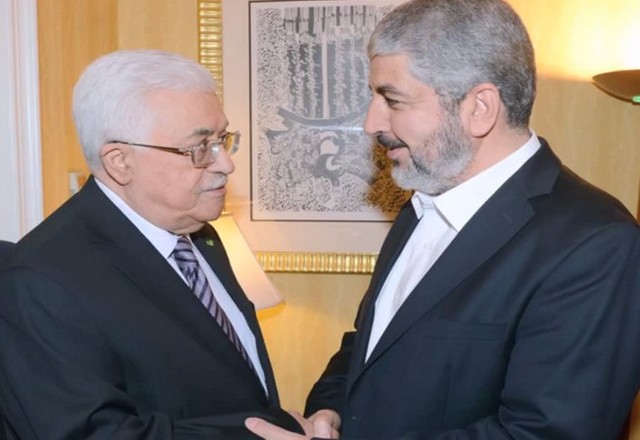Palestinian Political Concrete Jungle
Leadership stuck in the past, cemented in power by continued conflict.

Tzipi Livni, Israel’s former peace negotiator, dropped a bombshell yesterday when she explained in an interview with New York Times columnist Roger Cohen, how Palestinian Authority President Mahmoud Abbas torpedoed the American sponsored peace process earlier this year.
One would think that Abbas, who claims he wants a state for his people would try and negotiate one. Instead he took unilateral actions that alienated even the likes of Livni. For those who believe that the Palestinians would benefit from statehood, Abbas’ behavior is incomprehensible. Why would Abbas pass up a chance to negotiate for a state for his people, something which conventional wisdom tells us would benefit not only the Palestinians, but the whole Middle East as well? (In fact. Abbas may be refusing to compromise with Israel because Palestinians don’t want him to.)
But that isn’t the only recent report of Palestinian leaders putting their own concerns ahead of those of their people.
Neri Zilber of the Washington Institute for Near East Policy wrote Gaza’s Explosion Waiting to Happen for Politico earlier this week. The central part of Zilber’s report focused on the infighting between Fatah and Hamas, that has delayed the rebuilding of Gaza. Fatah, for its part, is supposed to take control of Gaza, but as one Fatah official asked “How do you expect me to go work in the Gaza Strip ‘when the Qassam Brigades [Hamas’s elite military wing] goes ahead of me in both power and weapons?’”
Zilber summed up the issue:
Seven years of Hamas control over Gaza would be gradually replaced by the Fatah-dominated PA, billions of dollars in donor aid would flow in, and the Gazan people would be liberated from the continued rule of an internationally-designated terrorist organization (and the continued need for an Israeli and Egyptian blockade around the territory). Or at least that was the idea.
But all these plans are on hold as Hamas and the PA engage in a game of political chicken, staring each other down , a reality confirmed to me over the past month in conversations with nearly two dozen Israeli and Palestinian officials (from both Fatah and Hamas), international diplomats and non-governmental sources based in Israel and the West Bank, some of whom requested to remain anonymous so as to speak more freely.
The most surprising aspect is the fatalism conveyed by both sides of the Palestinian divide. National unity was, to a man, held up as a necessity for the Palestinian people – yet the actual welfare of those Palestinians living in Gaza has apparently been deemed secondary to the considerations of power politics.
Without uncontested Fatah/Palestinian Authority control of Gaza, the promised aid has not come in and the rebuilding of Gaza has been limited.
Zilber adds a unexpected twist the to the story:
Perhaps even more surprising is that Israel, of all the parties involved, has shown the greatest degree of flexibility towards a Gaza Strip still ruled by Hamas. In addition to acquiescing to the salary payments, Israel has begun easing restrictions on construction materials and other goods entering the territory, and on certain products (fish, cucumbers) and people exiting. Israel has given its consent to an elaborate UN-led inspection mechanism for reconstruction, which as mentioned has not yet begun in earnest due to the lack of a PA presence on the ground. “I can’t say that it’s because of Israel that there has been no movement [on reconstruction] at present,” the senior UN official said, a sentiment shared by several other foreign diplomats I spoke to in Jerusalem.
To be sure there are risks associated with Israel’s flexibility.
As we saw with Livni’s account yesterday, Palestinian leadership is mostly interested in maintaining their power, not in compromise, even when Israel shows flexibility. Last week there were reports that Hamas was using concrete imported by Israel to rebuild terror tunnels.
Not only don’t they compromise with Israel, they pursue their individual agendas at the expense of each other, and a great cost to the people they claim to represent.
[Photo: The Times of India / YouTube ]
Donations tax deductible
to the full extent allowed by law.








Comments
Anwar Sadat was assassinated after signing a peace treaty with Israel, and Yasser Arafat, after refusing to sign what was possibly the best ever agreement for the Palestinians (negotiated with Ehud Barak) was reputed to have said to one of the Americans present ‘I am a dead man if I sign a peace agreement.’
Why would anyone sign a peace agreement knowing you will almost certainly be killed?
No matter what deal they signed, Hamas is unlikely to give up control over Gaza voluntarily. And the PA/Fatah is unlikely to force them out, mainly because they don’t want to be held responsible for allowing them to continue to operate, which they certainly will in any case.
When they made the agreement, it was with the attitude China had when it ‘promised’ Obama they would freeze carbon output after 2030. That is, by then no one who was a party to it will still be around or in power.
They are the Al Sharptons of the Middle East: hate is their business. It’s all they have.